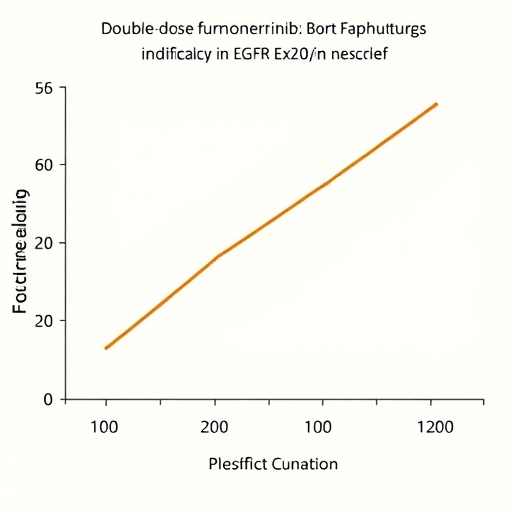In the realm of oncology, the landscape of targeted therapies is rapidly evolving. Recent research has illuminated the potential of double-dose furmonertinib specifically for patients suffering from advanced non-small cell lung cancer (NSCLC) harboring EGFR exon 20 insertions. This promising study led by Zhang et al. digs deep into the efficacy of this treatment regimen and meticulously analyzes various influencing factors that could affect patient responses. The ground-breaking findings are not just a beacon of hope but may reshape therapeutic protocols in clinical practice.
Furmonertinib, a third-generation epidermal growth factor receptor (EGFR) inhibitor, has emerged as a significant player against mutations known to confer resistance to traditional therapies. The research focuses on a very specific patient population—those with EGFR exon 20 insertions, a subgroup of NSCLC that historically presented with limited treatment options. These mutations introduce significant challenges due to their complex nature and have kept a cloud of uncertainty hanging over effective treatment strategies. The study deftly positions double-dose furmonertinib as a potential game-changer in this challenging landscape.
The methodology of the research is a cornerstone that merits attention. Zhang and colleagues utilized a robust dataset comprising clinical trial participants, each meticulously monitored to assess the drug’s therapeutic impact. The analysis encompassed not just initial responses but also long-term outcomes, enabling a comprehensive understanding of the drug’s efficacy over time. Such rigor establishes a solid foundation for determining how double doses may enhance drug bioavailability and improve overall survival rates among the patients studied.
As the study unfolds, it emphasizes the importance of stratifying patient populations according to their unique biological markers and response profiles. By dissecting response rates across various demographics, the researchers offer insights into how factors such as age, prior treatments, and genetic backgrounds influence drug efficacy. This nuanced approach is pivotal, as it acknowledges the heterogeneity inherent in cancer therapy and paves the way for more personalized treatment paradigms.
A particularly striking revelation from this study pertains to the correlation between dosage and clinical outcomes. The authors found that patients receiving double doses of furmonertinib showed significantly improved response rates compared to those on standard dosing regimens. This discovery prompts a re-evaluation of contemporary prescribing practices, urging healthcare professionals to consider higher dosing strategies that may yield better patient outcomes. Such findings underscore the promise of re-examining existing treatment protocols, particularly in an era where precision medicine is at the forefront of oncology.
Moreover, the implications of this research extend well beyond the specific patient population studied. The evidence presented may stimulate further investigations into the pharmacodynamics of furmonertinib and similar agents. Understanding how variations in dosing affect drug metabolism and action can inform the development of next-generation therapies designed to combat more resistant forms of cancer. This body of research might catalyze a broader dialogue about how the scientific community approaches treatment for different NSCLC subtypes.
The challenges of dealing with advanced EGFR ex20ins NSCLC cannot be overstated. Historically, treatments have been limited, and patient prognosis has often been bleak. However, the emergence of furmonertinib as a potential frontrunner shines a light of optimism for oncologists and patients alike. This study contributes vital data that could lead to more effective treatment strategies and, eventually, improved survival rates.
Furthermore, as the healthcare landscape continues to embrace the principles of evidence-based medicine, studies like this are invaluable in shaping clinical practice guidelines. The discourse sparked by Zhang et al.’s work may prompt regulatory agencies to expedite the evaluation of furmonertinib, swiftly guiding it towards broader clinical use. The urgency in the oncological community for new solutions necessitates rapid advancements that prioritize patient outcomes.
Zhang’s team has not only contributed valuable empirical evidence but has also sparked the need for a comprehensive exploration of the drug’s potential side effects when administered at higher doses. Understanding the safety profile is just as crucial as assessing efficacy. Ongoing studies will likely delve into dose-related adverse effects, shedding light on the potential trade-offs associated with aggressive treatment strategies.
In conclusion, the findings presented in this research illuminate a path forward in the treatment of advanced EGFR ex20ins NSCLC. Double-dose furmonertinib has emerged as a promising option that affords both oncologists and patients renewed hope in battling this challenging variant of lung cancer. This study serves as a crucial catalyst, encouraging further exploration and dialogue in the medical community, subsequently influencing clinical practices and enhancing patient care.
As the narrative around targeted therapies continues to evolve, it is imperative for the medical community to synthesize new knowledge and integrate it into practice to optimize therapeutic outcomes. The journey does not end here. Further investigations, clinical trials, and collaborative discussions will be crucial in affirming the role of double-dose furmonertinib in mainstream cancer treatment. The fight against cancer is relentless, but with research directed at understanding its complexities, there is hope for better, more effective therapies in the near future.
Subject of Research: Efficacy of double-dose furmonertinib in advanced EGFR ex20ins non-small cell lung cancer.
Article Title: Analysis of the efficacy and influencing factors of double-dose furmonertinib for advanced EGFR ex20ins non-small cell lung cancer.
Article References: Zhang, K., Ge, Y., Xu, Y. et al. Analysis of the efficacy and influencing factors of double-dose furmonertinib for advanced EGFR ex20ins non-small cell lung cancer. J Transl Med 23, 1178 (2025). https://doi.org/10.1186/s12967-025-07114-w
Image Credits: AI Generated
DOI:
Keywords: NSCLC, EGFR exon 20 insertions, double-dose furmonertinib, targeted therapy, oncology, cancer treatment, pharmacodynamics, precision medicine, patient outcomes.




